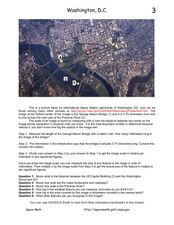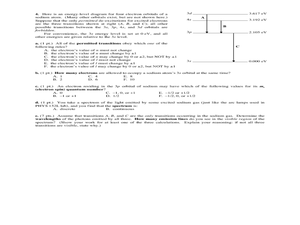American Museum of Natural History
Thinking in the Three Dimensions
Discover different dimensions with paper folding. Pupils first read about zero, one, two, and three dimensions, and then learn about the fourth dimension, time. They then use origami to create models of shapes in three dimensions and use...
Curated OER
Applied Science - Science and Math Lab
Create three dimensional objects in an applied science lesson plan. The goal is for your class to recognize, compare, and model shapes. Using cookie cutters and clay or play dough, they create models for three-dimensional shapes.
Space Awareness
What is a Constellation
Why do some stars in a constellation appear brighter than others? Using a get-up-and-move astronomy activity, scholars explore perspective and the appearance of constellations in the sky while developing an understanding of the...
Curated OER
Tomato Exploration
Create tomatoes in 15-20 minutes using this fun and interactive lesson plan! Learners listen to a book about tomatoes (recommendations listed), and focus on the vocabulary word tomato. They count the syllables...
NASA
Packing for a L-o-o-o-ng Trip to Mars
Pack just enough to fit. Crews determine what personal items to take with them on a trip to Mars. Each team must decide what to take with them on a two-and-a-half year trip to Mars and whether their items will fit within the allotted...
Curated OER
Unit III: Worksheet 3 - Uniform Acceleration
This three-page worksheet moves physics masters to show what they know about motion. They analyze graphs of time versus displacement, solve instantaneous and average velocities, solve word problems, and graph results. This is an...
Star Date
Shadow Play
Three activities make up a solar system lesson that features the sun, its light, and the shadows it produces. Scholars step outside to discover the changes shadows make at different times of day, take part in a demonstration of...
Curated OER
Mapping Deep-Sea Habitat
Students create a two-dimensional topographic map and a 3-D model of landforms. In this creative lesson students create 2 and 3-D objects and learn how to interpret the data from these things.
PBS
Helping Hand
Reach out and grab something. Given the task of picking up objects at least two feet away, pupils design and build a grabber. The last activity in a series of five challenges requires learners to use information about fulcrums and levers.
Curated OER
Circles to Spheres
Students investigate circles and spheres. In this space shapes lesson, students compare and contrast two-dimensional and three-dimensional shapes. Students investigate the relationship between plane and space shapes.
Curated OER
Fourth Grade Science
In this science worksheet, 4th graders answer multiple choice questions about natural objects, rainfall, the solar system, and more. Students complete 25 questions.
Curated OER
Objects Race 500
Young scholars explore the concept of "shape affects speed" through a series of experiments. In this physics lesson, students participate in an experiment in which various objects are released on an inclined plane. Speed and distance are...
Curated OER
2D Motion
Young scholars examine the motion of objects in two dimensions. In this dimensional lesson students view several demonstrations, complete a worksheet and a lab activity.
Curated OER
Electric Field Mapping in 3D
Students create a 3D vector field map of an electric field. In this physics lesson, students measure the voltage inside an aquarium with water. They present their findings and map to class..
Curated OER
Linear Motion 2
In this linear motion worksheet, students answer 12 questions about displacement, velocity, and acceleration. They solve problems for acceleration, displacement and velocity and show the equations they used to find the solutions. They...
Curated OER
Bellwork for Week 2-Experimental Design and Measurements
For this experimental design and measurement worksheet, learners answer questions about independent and dependent variables, they write hypotheses, they identify instruments that measure mass, weight, and volume and they calculate the...
Curated OER
Washington D.C. from Space
In this Washington D.C. from space worksheet, students use a picture generated by the International Space Station and they find the scale of the image. They determine the actual size of features in the image, they find the distances...
American Chemical Society
Finding Volume: The Water Displacement Method
We have formulas for finding the volume of geometric shapes, but what if the shape is irregular? Lesson describes how to find volume through water displacement. After a demonstration, scholars practice in small groups. Then analysis...
InqueryPhysics
Interpreting Motion Graphs
Every movement in the world can be measured and even motionless objects can be significant indicators of movement. Focus on motion graphs that feature distance vs. time, speed vs. time, and positive and negative acceleration.
Virginia Department of Education
Average Atomic Masses
Facilitate learning by using small objects to teach the principles of atomic mass in your science class. Pupils determine the average mass of varying beans as they perform a series of competitive experiments. They gather data and...
Institute of Electrical and Electronics Engineers
Can You Copperplate?
Introduce emerging engineers to the process of metal plating. This resource provides background reading on chemical engineering, plating, and corrosion. It concludes with a copper plating activity. The standards alignment list includes...
Curated OER
Butterfly 2: A Butterfly's Home
Young scholars determine which environmental characteristics make up a favorable butterfly habitat.
American Chemical Society
What is Density?
Density: the reason a giant pumpkin will float, but a tiny cranberry won't. Lesson begins with a demonstration of two of the same-sized cubes having different densities. Then pupils take eight cubes, each of the same size, and have to...
Curated OER
Physics 152 Fall 2004 Final Exam, Parts A, B, C, D
At the end of a general physics course focused on light and electricity, you can administer this exam. Concepts covered include electromagnetism, circuits, induction, light rays, lenses and mirrors, characteristics of light, electron...























